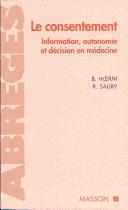| Listing 1 - 10 of 31 | << page >> |
Sort by
|
Periodical
Year: 2002 Publisher: Raadgevend Comité voor Bio-Ethiek
Abstract | Keywords | Export | Availability | Bookmark
 Loading...
Loading...Choose an application
- Reference Manager
- EndNote
- RefWorks (Direct export to RefWorks)
ethiek --- centre hospitalier de Mouscron --- bloedtransfusie --- weigeren van bloedtransfusie --- Getuigen van Jehova --- recht op weigeren van behandeling --- autonomie van de patiënt --- wilsonbekwame minderjarigen --- wilsbekwame minderjarigen --- competentie --- vrijwlligheid --- onderscheidingsvermogen --- Dr. Ph. Gadisseux

ISBN: 2225828962 9782225828966 Year: 1998 Publisher: Paris: Masson,
Abstract | Keywords | Export | Availability | Bookmark
 Loading...
Loading...Choose an application
- Reference Manager
- EndNote
- RefWorks (Direct export to RefWorks)
Relations médecin-patient --- Consentement éclairé (Droit médical) --- Ethics --- Informed Consent --- arts-patiëntrelatie --- autonomie van de patiënt --- wilsbekwaamheid (wilsonbekwaamheid, wilsbekwame patiënten, wilsonbekwame patiënten) --- geïnformeerde vrijwillige toestemming (instemming) --- relation médecin-patient --- autonomie du patient --- capacité (incapacité) --- consentement libre et éclairé --- Relations médecin-patient --- Consentement éclairé (Droit médical)
Multi
ISBN: 9061869137 Year: 1998 Volume: 186 Publisher: Leuven : Leuven University Press,
Abstract | Keywords | Export | Availability | Bookmark
 Loading...
Loading...Choose an application
- Reference Manager
- EndNote
- RefWorks (Direct export to RefWorks)
Deze studie heeft als opzet om vanuit psychiatrische hoek een nieuw perspectief binnen te brengen in het debat over de beslissingsbekwaamheid van bejaarden. De recente socioculturele en medische ontwikkelingen in de gezondheidszorg omtrent bejaarden maken dit noodzakelijk. Hiertoe onderneemt de auteur een vernieuwende poging om de notie beslisvaardigheid scherper te omschrijven vanuit een analyse van de impact van belangrijke psychiatrische ziektebeelden, zoals depressie, paranoia en dementie op het beslissingsproces. Dit resulteert onder meer in het afzonderen van ad hoc relevante operationele criteria om beslisvaardigheid te beoordelen. Deze analyse grijpt plaats vanuit een werkelijk interdisciplinaire bevraging van de problematiek. Hierbij wordt niet alleen gezocht naar criteria voor competentie die vanuit een klinisch-psychiatrisch standpunt relevant zijn; er wordt tevens een poging ondernomen om deze criteria te laten oplichten tegen de achtergrond van bepaalde actuele filosofisch-antropologische en ethische discussies.
Gerontologie --- Gérontologie --- Psychiatrie --- Academic collection --- bejaarde --- geestelijke gezondheid (geestelijke gezondheidszorg, geestesziekte) --- psychiatrie --- wilsbekwaamheid (wilsonbekwaamheid, wilsbekwame patiënten, wilsonbekwame patiënten) --- autonomie van de patiënt --- paternalisme (anti-paternalisme) --- depressie --- paranoia (waanstoornis, psychose) --- dementie (Alzheimer, ouderdomsdementie) --- personne agée --- santé mentale (soins de santé mentale, maladie mentale) --- capacité --- autonomie du patient --- dépression --- paranoïa (délire, psychose) --- démence --- Theses --- 253:61 --- 253:362.1 --- 253:362.1 Pastoraal voor zieken, ouderen en stervenden --- Pastoraal voor zieken, ouderen en stervenden --- 253:61 Pastorale geneeskunde --- Pastorale geneeskunde

ISBN: 0878408681 Year: 2001 Publisher: Washington Georgetown university press
Abstract | Keywords | Export | Availability | Bookmark
 Loading...
Loading...Choose an application
- Reference Manager
- EndNote
- RefWorks (Direct export to RefWorks)
Informed consent (Medical law) --- Right to die --- Terminally ill --- Law and legislation --- Legal status, laws, etc. --- levenseinde (einde van het leven, levenseindebeslissing) --- wilsbekwaamheid (wilsonbekwaamheid, wilsbekwame patiënten, wilsonbekwame patiënten) --- autonomie van de patiënt --- voorafgaande wilsverklaring (voorafgaande negatieve wilsverklaring, levenstestament, euthanasieverklaring) --- Verenigde Staten --- fin de vie (décision de fin de vie) --- capacité --- autonomie du patient --- testament de vie (directive anticipée) --- Etats Unis --- Legal status, laws, etc --- Dying persons --- Fatally ill --- Critically ill --- Death

ISBN: 1859726089 Year: 1998 Publisher: Brookfield Brookfield
Abstract | Keywords | Export | Availability | Bookmark
 Loading...
Loading...Choose an application
- Reference Manager
- EndNote
- RefWorks (Direct export to RefWorks)
This is an attempt to address the ethical issues raised by mental illness and its treatment by focusing on the question of autonomy. The mentally ill may be regarded as non-autonomous by virtue of irrationality, which may result in treatment models which may deny them a voice. As a counter to this, some have moved to the other extreme and argued that the mentally ill must be regarded as fully autonomous in all circumstances, and consequently that all their wishes regarding treatment must be respected. This book examines the ethical consequences of such simplistic approaches approaches towards autonomy and mental illness, and considers the ethical issues raised by specific forms of treatment. It is suggested in conclusion that improvement in the care and treatment of the mentally ill requires not only a fundamental change in social attitudes but also less impoverished conception of autonomy than some of those currently employed.
geestelijke gezondheid (geestelijke gezondheidszorg, geestesziekte) --- ethiek (ethische aspecten) --- autonomie van de patiënt --- gedwongen behandeling (dwangbehandeling) --- zorg (zorgverstrekking, zorgverlening) --- santé mentale (soins de santé mentale, maladie mentale) --- ethique (aspects ethiques) --- autonomie du patient --- traitement forcé --- soins (prestation de soins) --- Mental health services --- Psychiatric ethics. --- Moral and ethical aspects. --- Psychiatric ethics --- Mental health services ethics --- Behavioral health care --- Mental health care --- Psychiatric care --- Psychiatric services --- Moral and ethical aspects --- Medical ethics --- Medical care
Book
ISSN: 12918385 ISBN: 9782130573302 2130573304 Year: 2009 Publisher: Paris Presses universitaires de France
Abstract | Keywords | Export | Availability | Bookmark
 Loading...
Loading...Choose an application
- Reference Manager
- EndNote
- RefWorks (Direct export to RefWorks)
Ces vingt dernières années, des progrès considérables ont été accomplis dans la connaissance et la prise en charge de la maladie d'Alzheimer. Pourtant, cette affection reste difficile à penser. Quel est son rapport avec le vieillissement normal ? Est-ce une maladie ou un syndrôme ? Une maladie ou un handicap ? Une maladie «neurologique » ou «psychiatrique » ? La première partie de l ouvrage aborde ces questions d un point de vue historique. Elle montre comment la notion de maladie d'Alzheimer est apparue dans la littérature médicale et comment elle a pris le sens qu'on lui connaît aujourd hui. L'auteur suggère que les travaux d'Aloïs Alzheimer pourraient éclairer certains débats contemporains. La seconde partie de l'ouvrage examine deux dilemmes que rencontrent quotidiennement les professionnels et les familles. Faut-il dire aux personnes malades ce qui leur arrive et ce qui les attend ? Et comment respecter leur autonomie, quand elle est fragilisée par la maladie ? Ces réflexions éthiques conduisent, elles aussi, à envisager sous un nouveau jour la question de savoir ce que c'est, au juste, que la maladie d'Alzheimer.
Alzheimer Disease --- Ethics, Medical --- Patient Rights --- Personal Autonomy --- Alzheimer's disease --- History --- Moral and ethical aspects --- autonomie van de patiënt --- dementie (Alzheimer, ouderdomsdementie) --- filosofie (filosofische aspecten) --- geschiedenis (historische aspecten) --- onthulling van de waarheid --- Alzheimer disease --- Alzheimer's dementia --- autonomie du patient --- démence --- philosophie (aspects philosophiques) --- histoire (aspects historiques) --- révélation de la vérité --- Basal ganglia --- Presenile dementia --- Senile dementia --- Diseases --- Alzheimer's disease - History --- Alzheimer's disease - Moral and ethical aspects
Book
ISBN: 9789031376162 9789031352081 Year: 2009 Publisher: Houten Bohn Stafleu Van Loghum
Abstract | Keywords | Export | Availability | Bookmark
 Loading...
Loading...Choose an application
- Reference Manager
- EndNote
- RefWorks (Direct export to RefWorks)
Stamcelonderzoek, nanotechnologie: technologische vernieuwingen vormen vaak een aanleiding om opnieuw na te denken over moreel verantwoorde toepassingen binnen de gezondheidszorg. Ook ontwikkelingen in het maatschappelijk denken vragen om een ethisch debat, bijvoorbeeld over embryoselectie en palliatieve sedatie. Kortom, wie zich breed wil oriënteren op medisch-ethische kwesties vindt in dit boek een analyse van relevante perspectieven.
Medische ethiek --- bio-ethiek (medische, biomedische ethiek, bio-ethische aspecten) --- autonomie van de patiënt --- 603.1 --- arts-verpleegkundige relatie (verpleegkundige-arts relatie) --- autonomie --- beroepsgeheim --- collocatie --- communicatie (leesbaarheid) --- deontologie (beroepscode, code, plichtenleer) --- dwangbehandeling --- ethiek (moraal) --- euthanasie --- gezondheidszorg (gezondheidsbeleid, sociale geneeskunde) --- informed consent --- medische ethiek --- medische experimenten --- medische technologie --- palliatieve zorgen --- prenatale diagnose --- stervensbegeleiding --- therapeutische hardnekkigheid --- wetenschappelijk onderzoek --- wilsonbekwaamheid --- bioéthique (éthique médicale, biomédicale, aspects bioéthiques) --- autonomie du patient --- (zie ook: terminale zorgen) --- (zie ook: genetisch advies) --- (zie ook: dood, euthanasie, palliatieve zorgen, rouw, terminale zorgen) --- (zie ook: onderzoek)

ISBN: 0878409068 Year: 2003 Publisher: Washington, D.C. Georgetown University Press
Abstract | Keywords | Export | Availability | Bookmark
 Loading...
Loading...Choose an application
- Reference Manager
- EndNote
- RefWorks (Direct export to RefWorks)
Modern psychological and political theory meet head-on in this powerful re-evaluation of America's contradictory and sometimes dangerous addiction to individualism. Best-selling author Gaylin and co-author Jennings investigate the contentious intersections of interdependence and autonomy, rights and public responsibility. They examine the painful abrasion occurring between America's tradition of personal freedom and privacy, as it rubs against the still valuable if almost vanishing ideals of sacrifice and social order. Our current culture of autonomy - championed by both liberals on the left and libertarians on the right - is based on the idea of rationality as the motivation for human conduct. But, as the authors remind us, people are not simply rational creatures - appeals to emotions are always far more effective than logical argument in changing our behavior. This timely edition includes a new preface; updated examples and illustrations throughout; and, new coverage of contemporary social critics and their work since the publication of the first edition. Two essential new chapters, one on the movement to forgo life-sustaining treatment and the other on physician-assisted suicide, particularly clarify the authors' arguments. Drawing on these and numerous other illustrations - with significant emphasis on the state of American health care - Gaylin and Jennings demonstrate that society has not just the right but the duty to occasionally invoke fear, shame, and guilt in order to motivate humane behavior. As cases of AIDS are once again on the upswing, as the dangerously mentally ill are allowed to wander free and untreated, as starvation and poverty still hold too many in its grip in the richest nation on the planet, this controversial book, considerably revised and expanded, is needed more than ever. If we are to indeed preserve and nurture a genuinely free - and liberal - society, the authors suggest that these "coercions" may be essential for the health and the maturity of a nation where we all too often avert our eyes, not seeing that our neighbor is in pain or trouble and needs our help.
Social ethics --- Political philosophy. Social philosophy --- United States --- Civil society --- Individualism --- Involuntary treatment --- Libertarianism --- autonomie --- autonomie van de patiënt --- verantwoordelijkheid (verantwoordingsplicht, verantwoording) --- paternalisme (anti-paternalisme) --- gedwongen behandeling (dwangbehandeling) --- sociale uitsluiting --- maatschappelijke evolutie (sociale verandering) --- sociologie (sociologische aspecten) --- socio-economische aspecten (socio-economische factoren) --- filosofie (filosofische aspecten) --- ethiek (ethische aspecten) --- autonomie du patient --- responsabilité (imputabilité, obligation de rendre compte) --- traitement forcé --- exclusion sociale --- évolution sociale (changement social) --- sociologie (aspects sociologiques) --- aspects socio-économiques (facteurs socio-économiques) --- philosophie (aspects philosophiques) --- ethique (aspects ethiques) --- Coerced treatment --- Coercive care --- Coercive treatment --- Compulsory treatment --- Enforced treatment --- Forced treatment --- Treatment, Involuntary --- Patients --- Therapeutics --- Informed consent (Medical law) --- Legal status, laws, etc. --- United States of America
Book
ISBN: 2870372310 9782870372319 Year: 1997 Volume: 1 Publisher: Namur : Presses universitaires de Namur,
Abstract | Keywords | Export | Availability | Bookmark
 Loading...
Loading...Choose an application
- Reference Manager
- EndNote
- RefWorks (Direct export to RefWorks)
Le handicap met à l'épreuve nos valeurs, notre dignité et notre humanité. Nous aimerions qu'à travers ce livre nous puissions nous interroger sur ce que signifient d'un point de vue éthique, socio-politique et psychologique les concepts d'éducation et de rééducation, de reclassement et de réadaptation, d'intégration et de participation à la vie sociale. Ne cachent-ils pas parfois une sacralisation de la société telle qu'elle est et une interprétation trop faible du droit à la différence ? Il faut examiner l'origine sociale possible de certains handicaps et le renforcement de ceux-ci par les institutions, l'imaginaire et la culture. L'idée du droit à la différence n'implique pas seulement que la personne handicapée ait une place reconnue dans la société. Elle implique qu'on lui fasse une place dans la sociabilité et que l'éthique ait prise aussi sur la politique, l'économique et les relations humaines. Le département de Psychologie de la Faculté de Médecine et le Centre Interfacultaire Droit, Ethique, sciences de la Santé des Facultés Universitaires Notre-Dame de la Paix, ont mis ensemble leurs compétences pour tenter d'aborder, avec d'autres, ces questions cruciales en matière de déficience mentale.
Ethique philosophique --- Geestelijke gezondheidszorg --- Gehandicapten --- Handicapés --- Hygiène mentale --- Maatschappij --- Société --- Wijsgerige ethiek --- Mental retardation --- Déficience intellectuelle --- Moral and ethical aspects --- Social aspects --- Aspect moral --- Aspect social --- geestelijke gezondheid (geestelijke gezondheidszorg, geestesziekte) --- persoon met een handicap (persoon met een mentale handicap, persoon met een lichamelijke handicap, persoon met een meervoudige handicap) --- ethiek (ethische aspecten) --- beleid (politieke aspecten) --- maatschappelijke integratie --- autonomie van de patiënt --- cultuur (culturele aspecten) --- recht (wetgeving, rechtspraak, rechtsbeginselen, juridische aspecten, aansprakelijkheid) --- santé mentale (soins de santé mentale, maladie mentale) --- personne handicapée (handicapé, handicapé mental, handicapé physique, polyhandicapé) --- ethique (aspects ethiques) --- politique (aspects politiques) --- intégration sociale --- autonomie du patient --- culture (aspects culturels) --- droit (aspects juridiques, législation, jurisprudence, principes de droit, responsabilité)
Book
ISBN: 2870097972 Year: 2002 Volume: 240 Publisher: [Sprimont] : Mardaga,
Abstract | Keywords | Export | Availability | Bookmark
 Loading...
Loading...Choose an application
- Reference Manager
- EndNote
- RefWorks (Direct export to RefWorks)
Assurer des soins de santé de qualité accessibles à tous ressemble de plus en plus à la quadrature du cercle. Gestionnaires, infirmie(è)r(e)s, médecins et paramédicaux sont placés quotidiennement devant des choix cornéliens, le maintien de l'outil hospitalier étant de moins en moins compatible avec une médecine respectueuse de l'homme, efficace et d'un rapport qualité/coût raisonnable. Il en résulte d'importantes victimisations à tous les niveaux et pour tous les acteurs du secteur des soins de santé. L'auteur essaie de comprendre, d'expliquer et de trouver des remèdes à ces formes nouvelles de victimisation.
Medical economics. --- Health services accessibility. --- Economie de la santé --- Services de santé --- Accessibilité --- 351.84*7 --- 614.256 --- gezondheidszorg --- gezondheidseconomie (gezondheidszorgeconomie) --- gezondheidszorgbeleid (gezondheidszorghervorming, gezondheidszorgsysteem) --- gezondheidszorgkwaliteit --- medicalisering --- autonomie van de patiënt --- Medisch recht. Gezondheidsrecht. Wetgeving i.v.m. ziekenhuizen --- Medische verantwoordelijkheid. Beroepsrisico's van artsen --- soins de santé --- économie de la santé (économie des soins de santé) --- politique des soins de santé (réforme des soins de santé, système des soins de santé) --- qualité des soins de santé --- médicalisation --- autonomie du patient --- 351.84*7 Medisch recht. Gezondheidsrecht. Wetgeving i.v.m. ziekenhuizen --- Economie de la santé --- Services de santé --- Accessibilité
| Listing 1 - 10 of 31 | << page >> |
Sort by
|

 Search
Search Feedback
Feedback About UniCat
About UniCat  Help
Help News
News